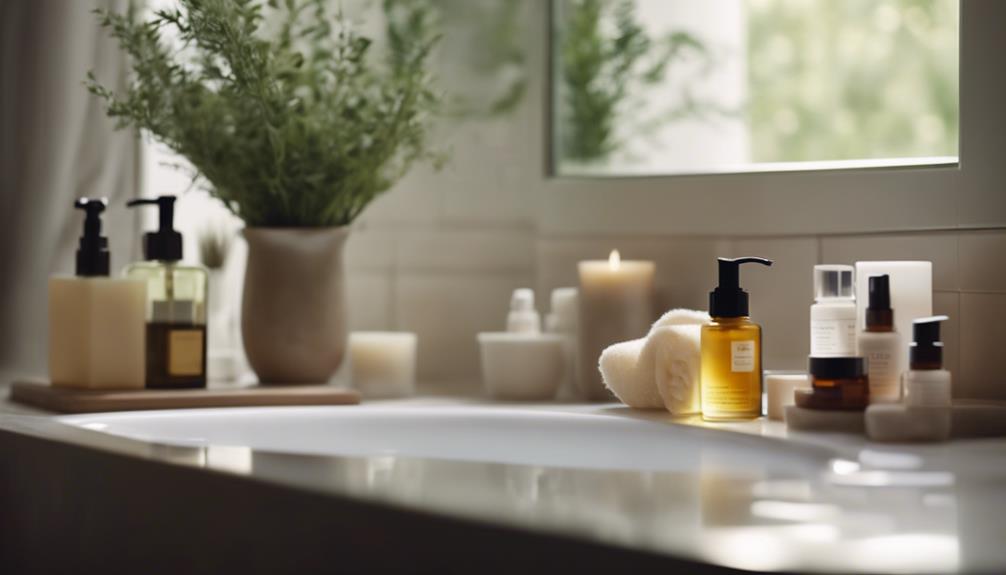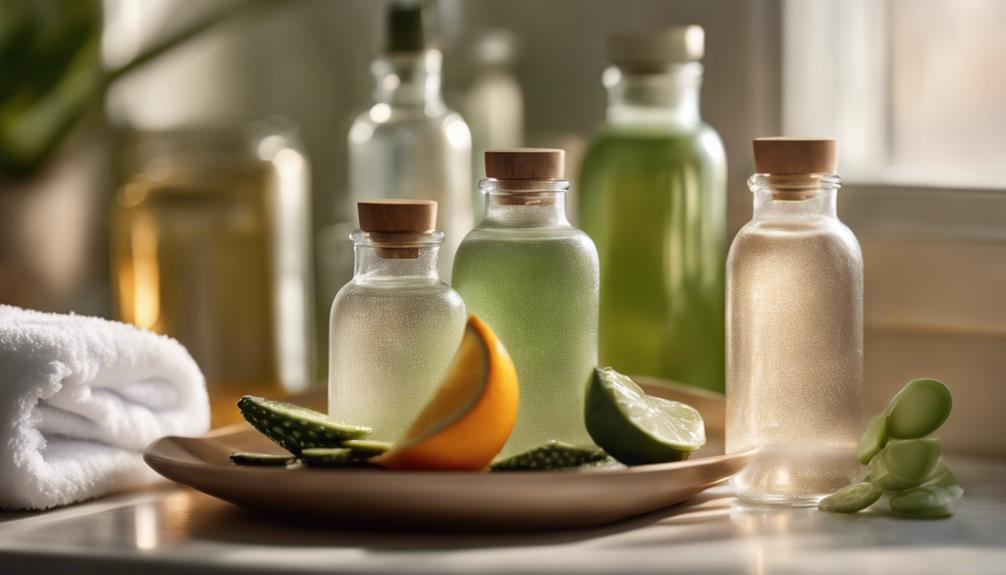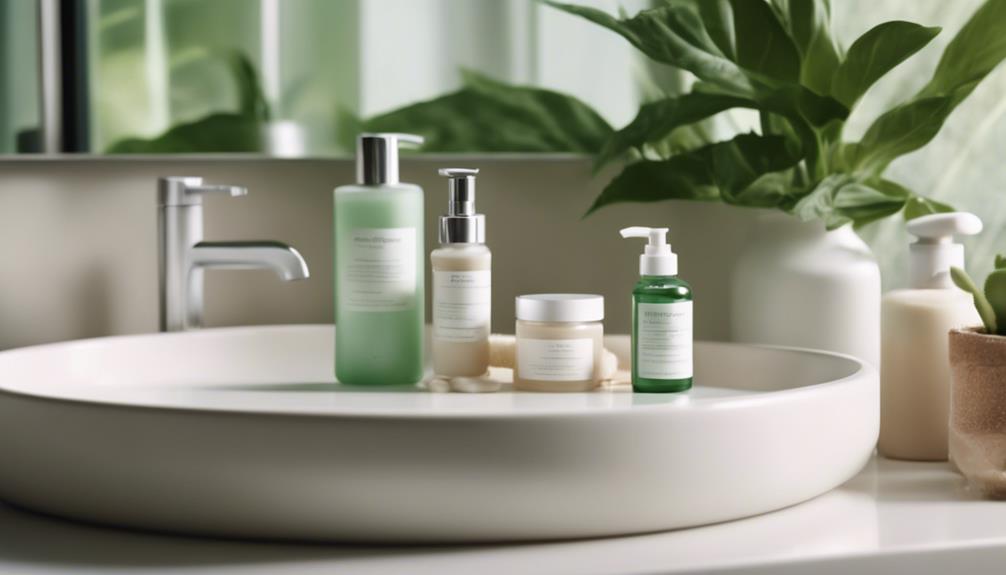To effectively manage hormonal acne, it is important to create a personalized skincare regimen that includes gentle cleansing, regular exfoliation, and oil-free moisturizers. Begin by using a non-comedogenic cleanser to remove impurities without stripping your skin of its natural oils. Exfoliate your skin 2-3 times a week with chemical exfoliants such as AHAs or BHAs to encourage cell turnover. Opt for lightweight, oil-free moisturizers containing ingredients like niacinamide and hyaluronic acid to maintain skin hydration. Additionally, pay attention to your diet and lifestyle choices, as they are crucial factors in controlling breakouts. You may discover more helpful tips that can significantly enhance your acne management.
Key Takeaways
- Establish a gentle skincare routine with a non-comedogenic cleanser to remove impurities without stripping moisture from the skin.
- Exfoliate 2-3 times a week using chemical exfoliants to promote cell turnover and prevent clogged pores.
- Choose oil-free, non-comedogenic moisturizers with hydrating ingredients like hyaluronic acid to maintain skin hydration.
- Maintain a balanced diet, reducing dairy and high-glycemic foods while incorporating omega-3 fatty acids and probiotics for skin health.
Understanding Hormonal Acne
Hormonal acne, a common skin condition primarily affecting adults, especially women, is driven by fluctuations in hormone levels, particularly androgens.
This type of acne often manifests as cystic lesions, mainly along the jawline and chin, and can also appear on the chest and back. If you experience breakouts that seem to align with your menstrual cycle, you're not alone. Many women find that their hormonal changes lead to increased acne vulgaris, especially in the days leading up to menstruation.
The sebaceous glands in your skin produce excess oil during these hormonal fluctuations, contributing to clogged pores and inflamed breakouts.
Understanding your unique triggers is vital, as factors like genetics, stress, and lifestyle choices can exacerbate your hormonal acne. It's important to differentiate hormonal acne from other types to tailor your skin care routine effectively.
By identifying patterns in your breakouts, like when they occur in relation to your cycle, you can better manage this condition and minimize its impact on your skin.
Essential Skincare Steps
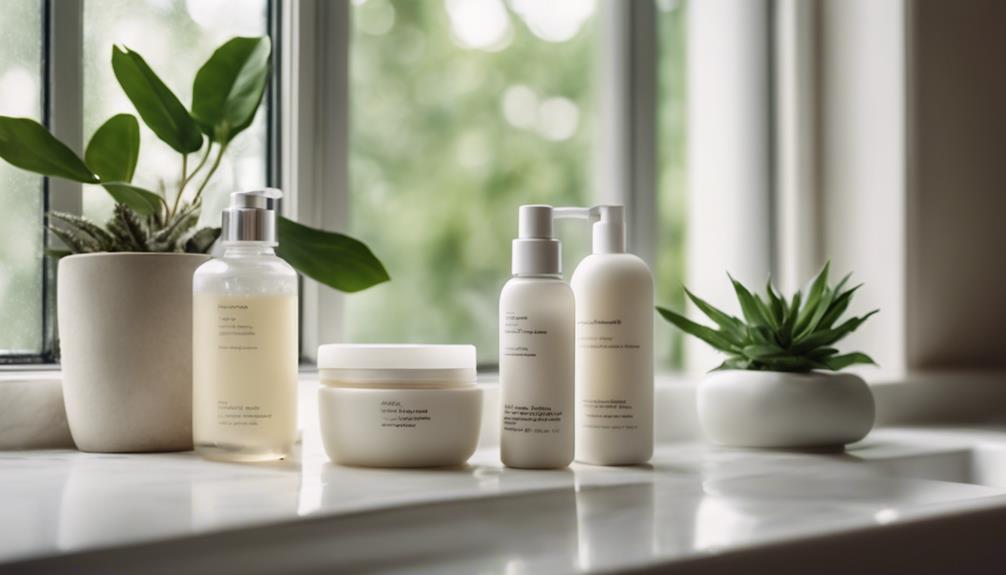
To effectively manage hormonal acne, it's essential to establish a solid skincare routine.
Start with gentle cleansing techniques, and don't forget to incorporate exfoliation at the right frequency.
Choosing the right moisturizer is just as important to keep your skin hydrated without causing breakouts.
Gentle Cleansing Techniques
Gentle cleansing is essential for maintaining healthy skin, especially when dealing with hormonal acne. Start by choosing a gentle, non-comedogenic cleanser that effectively removes impurities without stripping your skin of its natural moisture. Use warm water to prepare your skin, as it helps open up your pores and enhances the cleansing process.
Lather the cleanser in your hands before applying it to your face. This method helps distribute the product evenly and reduces the risk of irritation. Gently massage the cleanser onto your skin in circular motions. This technique promotes circulation and aids in the removal of debris and excess oil, ensuring a thorough cleanse.
After massaging the cleanser, rinse your face thoroughly with lukewarm water. Make sure all product residue is washed away, as leftover cleanser can lead to irritation.
Exfoliation Frequency Guidelines
Exfoliation plays an essential role in maintaining clear skin, especially for those struggling with acne, by promoting cell turnover and preventing clogged pores. To effectively manage hormonal acne, you should exfoliate 2-3 times a week using chemical exfoliants like AHAs or BHAs. These ingredients help slough off dead skin cells, enhancing your skin texture and reducing the chances of breakouts.
However, it's important not to overdo it. Over-exfoliating can irritate your skin and lead to increased oil production, which could worsen your acne. If your skin is sensitive, start with exfoliating once a week and gradually increase the frequency as your skin becomes accustomed.
After exfoliation, always follow up with a hydrating toner and a moisturizer to maintain your skin's moisture balance and prevent dryness. This step is essential for keeping your skin healthy and replenished after the exfoliation process.
Moisturizer Selection Tips
When choosing a moisturizer for hormonal acne, prioritize oil-free and non-comedogenic formulas to keep your pores clear and prevent breakouts. A well-selected moisturizer can make a significant difference in managing your skin's condition. Here are some tips to help you find the right one:
- Look for Key Ingredients: Choose a moisturizer that contains hyaluronic acid for hydration without added oil. This ingredient helps maintain moisture balance, making it perfect for acne-prone skin.
- Opt for Lightweight Gel-Based Options: Lightweight gel-based moisturizers absorb quickly and don't leave a greasy residue. This guarantees your skin feels fresh while effectively providing hydration.
- Incorporate Niacinamide and SPF: Select moisturizers that include niacinamide to help reduce redness and inflammation. Additionally, make certain it has broad-spectrum SPF to protect your skin from UV damage, especially if you're using acne treatments that can increase sensitivity.
Key Ingredients for Treatment
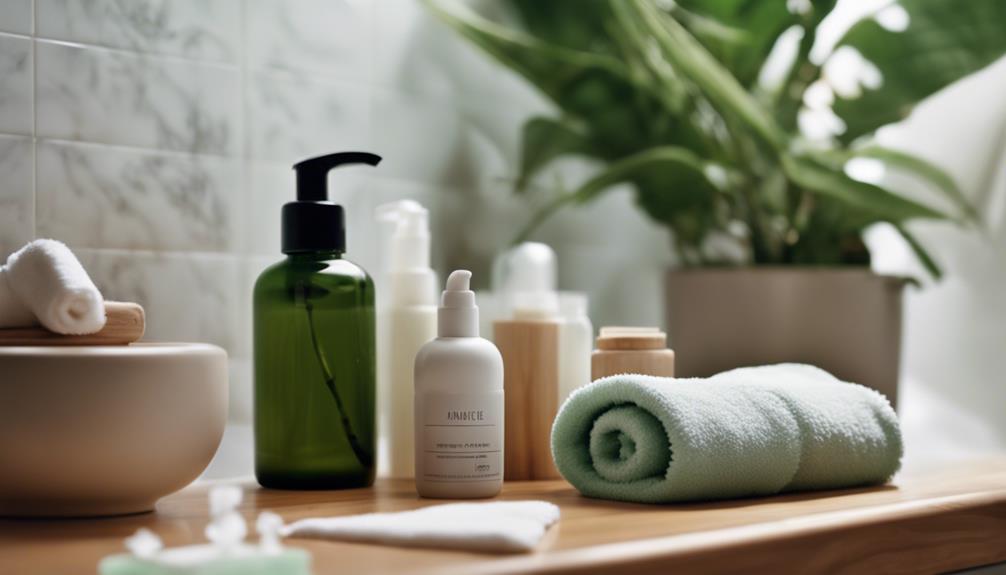
Effective treatment for hormonal acne relies on key ingredients that target the root causes of breakouts and promote healthier skin.
Start with Salicylic Acid, a beta hydroxy acid that penetrates pores to exfoliate and unclog them, helping to minimize hormonal acne breakouts.
Next, consider Benzoyl Peroxide, which boasts antibacterial properties to eliminate acne-causing bacteria and reduce inflammation, preventing future flare-ups.
Incorporate Retinoids into your routine, as these vitamin A derivatives encourage cell turnover, preventing clogged pores and diminishing the appearance of acne scars.
Niacinamide is another essential ingredient; it reduces inflammation, lessens redness, and strengthens your skin barrier, making it beneficial for hormonal acne management.
Lastly, don't overlook Hyaluronic Acid. This powerful humectant hydrates your skin without clogging pores, making it perfect for acne-prone individuals seeking moisture without added oil.
Lifestyle Modifications

Incorporating lifestyle modifications can greatly enhance your skincare routine and help manage hormonal acne more effectively. By making a few changes to your daily habits, you can improve your skin's health and reduce breakouts.
Here are three key lifestyle modifications to keep in mind:
- Balanced Diet: Focus on a diet rich in fruits, vegetables, and whole grains while limiting dairy and high-glycemic foods. This can support skin health and reduce flare-ups.
- Regular Exercise: Engage in regular physical activity to boost circulation and balance hormones. Exercise also helps reduce stress, which is vital for hormonal regulation.
- Quality Sleep: Aim for 7-9 hours of sleep each night. Quality sleep is essential for skin repair and can greatly impact hormonal regulation.
Additionally, don't forget about hydration; drinking at least 8 glasses of water daily helps maintain skin moisture.
Professional Help and Treatments
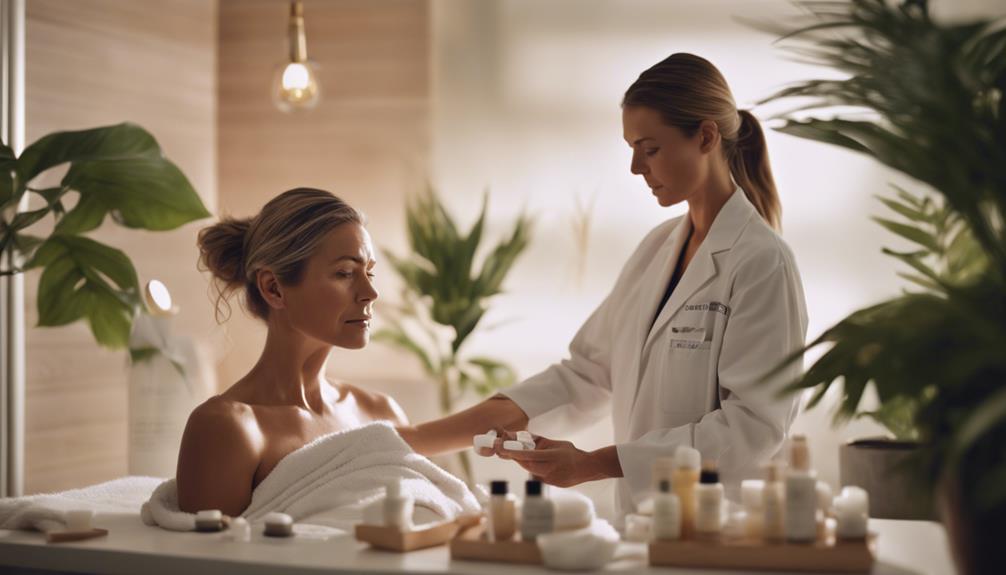
Seeking professional help is vital for managing persistent hormonal acne, as dermatologists can offer personalized treatment plans tailored to your unique skin needs. They'll evaluate your condition and may recommend prescription treatments, such as oral contraceptives like Yaz or Ortho Tri-Cyclen, which can help regulate hormones and reduce breakouts.
If you're dealing with excessive oil production, medications like spironolactone can effectively block testosterone effects on your oil glands, helping to control hormonal acne. Skilled dermatologists also provide guidance on topical treatments that can complement your routine.
Regular follow-ups with a qualified healthcare professional are essential for monitoring your skin's response to the treatments. This allows for timely adjustments to your plan, ensuring you get the best results possible.
For those seeking more advanced therapies, options like chemical peels and laser treatments can greatly improve skin texture and reduce scarring. These treatments, guided by professional help, can enhance the effectiveness of your skincare products and ultimately lead to clearer skin.
Don't hesitate to reach out for expert advice; it might be the key to conquering your hormonal acne.
Dietary Adjustments for Acne Management

Making smart dietary choices can greatly impact your hormonal acne management. By making a few key dietary adjustments, you can help reduce breakouts and improve your skin health. Here are three effective changes to contemplate:
- Reduce dairy intake: A diet high in dairy can raise testosterone levels, worsening hormonal acne. Cutting back on milk, cheese, and yogurt may help stabilize your hormones.
- Incorporate omega-3 fatty acids: Foods like fatty fish, walnuts, and flaxseeds are rich in omega-3s, which can help reduce inflammation in your body. Lower inflammation levels can lead to clearer skin.
- Limit high-glycemic index foods: Foods such as white bread and sugary snacks can cause insulin spikes, triggering acne flare-ups. Opt for whole grains and healthier snacks instead.
Additionally, don't forget about probiotics! Fermented foods like yogurt and kimchi can promote gut health, which is increasingly linked to skin health.
Conclusion
In the journey to clear skin, think of your routine as a garden. Nurture it with the right ingredients and care, allowing your confidence to bloom.
By understanding your skin's needs and making simple lifestyle adjustments, you can transform hormonal acne from a thorny weed into a vibrant flower.
Remember, seeking professional help is just like getting a gardener's advice—sometimes, a little extra support is all you need to cultivate your best self.
